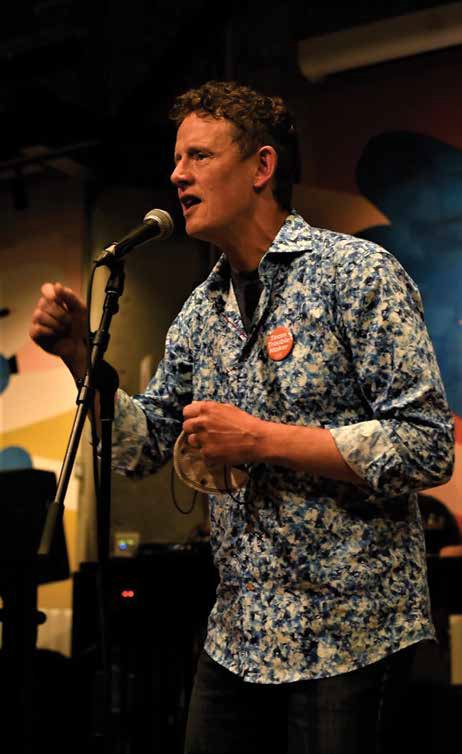MAINSTREETER STAFF
Bucking the blue conservative wave that engulfed much of Ontario in the June 2nd provincial election, Ottawa Centre incumbent Joel Harden managed to not merely hang on to his seat for the NDP but to widen his margin of victory compared to his first electoral win in the 2018 campaign.
Harden, known for his grassroots approach to politics, told his ecstatic supporters on election night that he owed his success to his concerted efforts to make communities within his riding better places to live.

Ottawa Centre MPP Joel Harden celebrated a dominant win in the June 2nd election with his supporters, attributing his success to his hyper-local approach to provincial politics. Photo Supplied
He hinted that the NDP might have fared better across the province had others within the party paid less attention to partisan sniping at Queen’s Park and more attention to local issues. “I think had we done that two years ago, we would have had a different result,” Harden said following his lopsided win over nine other candidates vying for Ottawa Centre.
Provincially, both the NDP under Andrea Horwath and the Liberals under Steven Del Duca stalled badly in their attempts to improve their party’s seat count at Queen’s Park. The NDP lost nine seats – down from 40 to 31 – and the Liberals added one seat – from seven to eight – but again failed to achieve major party status in the legislature. As a consequence, both Horwath and Del Duca resigned as party leaders on election night.
Prior to Horwath’s resignation announcement, Harden was asked if he felt the NDP needed a leadership change, and he answered in the positive. His comments were widely-reported both before and after Horwath announced her decision to step aside.
After comfortably retaining his seat in Ottawa Centre, Harden was also asked about his own leadership aspirations and responded that running for the top job in the party was not top of mind for him, though he didn’t rule out the possibility.
Local issues predominated during the campaign, and the May 21st storm that buffeted parts of the riding brought the issue of climate change to the fore for many of the candidates. For Harden, issues of importance included the loss of trees at the Experimental Farm to make way for the new Civic campus of The Ottawa Hospital and its associated parking garage and the failure to engage in meaningful consultations on the Lansdowne Park rebuild.
A popular and visible figure in and around Old Ottawa East, Harden focused his election night speech to supporters and comments to the media on his “hyperlocal” style and approach to provincial politics. He decried the party partisanship that dominates politics at Queen’s Park and spoke to an approach that concentrated on community action, and one that expended more energy on grassroots issues. He said less emphasis should be placed on promoting the party leaders and more attention paid to working with and funding local community organizations such as the food bank.
Harden burst on the provincial political scene in 2018 when he took the Ottawa Centre riding in an upset fashion, defeating then-incumbent Liberal and Ontario Attorney-General Yasir Naqvi, winning 46.1 percent of the vote to Naqvi’s 32.8 percent the vote. While Naqvi has rebounded with success in the last federal election, Harden has consolidated his stranglehold on Ottawa Centre provincially, increasing his winning share of the vote count to 54.4 percent, far ahead of second-place finisher Katie Gibbs of the Liberals, who collected 22.5 percent of the votes tallied in the riding.
In a message to her supporters, Gibbs described running for office in this campaign as “the experience of her lifetime.” She referred to herself as an organizer at heart and said she was committed to keeping fighting. “…for me it’s always the act of showing up and fighting for better that needs to be celebrated, not the result.”
candidate Scott Healey placed third in the vote, netting 15.7 percent of the vote, while the Green Party’s Shelby Bertrand was fourth with 4.8 percent of the vote. Six other candidates from various parties also contested the riding.






